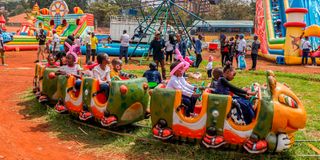
Children enjoy a ride at Green Park in Nairobi on March 31, 2024 as Christians marked Easter Sunday.
The ten-month school closure forced by the Covid-19 pandemic in 2020 remains one of the most challenging times for parents and the education sector in recent times.
Hundreds of thousands of learners dropped out of school and others got pregnant. It has been reported that drug and substance abuse has been on the rise.
A report by the Presidential Policy and Strategic Unit indicated that when schools reopened in January 2021, 250,000 girls and 125,000 boys, who were in school before the pandemic, did not report back.
School, as was previously known, changed completely. Therefore, whenever schools close, there is anxiety as parents search for ways to keep their children occupied and out of trouble.
The first term of 2024 will officially come to an end this week, bringing a close to a difficult term for managements of schools which have had to make do with meagre resources to run their institutions.
Some schools closed last week against government guidelines, citing lack of funds to sustain children in school.
Whereas head teachers and principals are eager to close schools and hand over the children to their families for the three-week break, parents are scratching their heads figuring out ways of balancing work responsibilities and supervising the children.
The government banned holiday tuition which used to be popular, as it kept learners under teachers’ watch during school breaks.
“There are several age-appropriate activities for children depending on where they are and the resources available. If a parent is engaged in an activity that their child can be part of, then this could be a good time to enjoin them, for example working in a business or shamba work and maybe keep their allowance for pocket money when schools reopen,” counselling psychologist and former teacher, Loice Noo told Nation.
According to her, there is need for careful planning and agreement between parents and their children on the activities to undertake during the holidays.
This includes visits away from home or mentorship sessions for some form of motivation and perhaps apprenticeship. Ms Noo says that such talks should be suitable for learners who may have identified their career path and would benefit from them.
“The very young ones could benefit from organised games, sports or learning new skills like music, arts and new languages. For those in final classes, these leisure and fun activities should be alternated with guided revision,” said Ms Noo.
She suggested that where some of the proposed programmes are not available, parents can mobilise others because children benefit from organised group activities.
Jacob Nzioka, a teacher in Ngong town, Kajiado County told Nation that during the schools holidays, he is usually fully booked by parents to offer private tuition at home. He revealed that he charges between Sh2,000 and Sh3,000 per two-hour sessions depending on the distance he has to cover to get to a client.
“Although the government banned tuition during the holidays, the parents reach out to us. We help them to keep the children busy but also make some money on the side,” he said.
For Lydia Wanjohi, a mother of three who lives in Nairobi, the break will serve as a time to bond with her children. Two of them are in secondary school and one is in primary school.
“I’ve taken leave for the last two weeks of the school holiday to stay with my children. They weren’t home over Easter because they’re in boarding school and I was also alone at home. We’ll be go upcountry for one week and come back for one week to shop and prepare for the schools opening,” she told Nation.
The chair of the National Parents Association Silas Obuhatsa urged parents to put in place supervision measures to help reduce dangers that might befall their children during the break.
“It's not the role of teachers to follow and look after children in homes during school holidays. Parents should sit with their children and guide them on negative things that might affect their education. When children are left idle, they get involved in many private things that parents may not know,” he said.
Mr Obuhatsa noted that child labour is also on the rise in both rural and urban areas where school children find it easy to do odd jobs for easy cash. This includes working on farms and operating boda bodas, activities he said can expose children to drug and substance abuse.
“The government has as well a responsibility of taking stern action against anyone found risking school-going children's lives. We also wish to advise the public to be aware of school children and treat them as government property as a way of helping parents to take care of them,” Mr Obuhatsa said.









